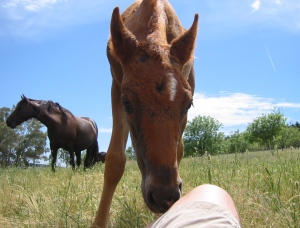By Judy Oldmeadow, Owner & Master Horsewoman, Samaria Creek Morgan Horses
The word mindfulness conjures pictures of Buddhist monks and serious meditation classes; a total contrast to my busy life.
I rush through my days practising mindlessness; arriving at destinations without remembering the journey.
I look in my diary to see what I did two days ago and can’t remember what I had for dinner last night; or if I enjoyed it.
This morning I received a reminder from copywriter friend Paul Hassing; almost two months had lapsed since I’d promised him a post for this blog.
It was his second reminder; the last one said I was still getting good visitor traffic on Good Morgans, even though it was almost a year since I’d posted.
I enjoy reading Paul’s blog. Tuesday’s post said he didn’t call a client after submitting a quote for fear of hassling them. I usually don’t comment on blogs for fear of ridicule (though I did add my two cents to this one).
Communicating with horses is simpler; they’re always mindful, never judgemental.
I visit my horses daily and use them for my Understanding Horses workshops to teach communication and mindfulness.
Recently, I was the student.
Fifteen-year-old mare Tanjil is the respected leader of 26 female horses: yearlings, two-year-olds, mares with foals at foot and retired brood mares.
They roam large bush paddocks and I don’t tie them up when I brush and handle them.
Tanjil had some rain scald (a condition caused by warm weather after rain) on her rump. I was using a plastic brush to remove the scabs and loose hair.
As I started brushing I was aware of:
- Three mares nearby.
- Tanjil’s foal butting her other side to get a drink.
- Her expression, to see if I was hurting her.
I picked at crusty skin, allowing my mind to drift to:
- A broken fence.
- A complaining friend.
- Unpaid accounts.
Before long, I wasn’t carefully grooming a beloved horse: I was scraping the BBQ …
BAM!
I was lying on the grass with four horses staring down at me.
Mindfulness returned as I stared into Tanjil’s kind eyes.
She could have kicked and broken my leg or bitten a chunk from my arm when I hurt her.
Instead, she knocked me over with a quick push of her hock.
I stood and checked for injuries … fortunately only my pride was bruised.
As I tactfully approached Tanjil to finish cleaning her, she curled her head around to me as if to say, ‘I’m glad you’re paying attention now.’
Half an hour in the paddock taught me about focus, trust, forgiveness and compassion.
I wonder if it’s possible for humans to practice the honest, non-judgemental communication of horses.
How many boundaries must we set?
How often must we be thrown to the ground
before we become
mindful?




